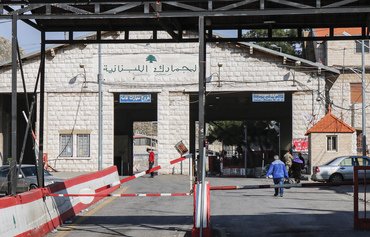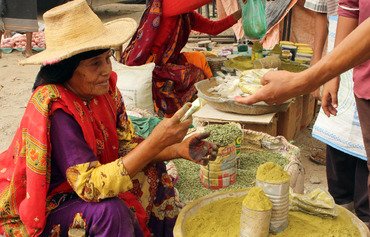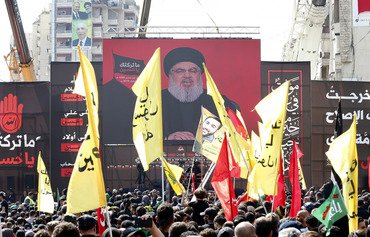BEIRUT -- Reports of dollar smuggling operations between Lebanon and Syria come amid an unprecedented rise in the exchange rate of the US dollar on the black market in Lebanon, and the fall of the Syrian pound against the dollar.
In late December, the dollar reached 48,000 LBP on the black market before dropping back to the 42,000 to 43,000 range, Lebanese media reported.
In a statement issued December 27, the Central Bank of Lebanon attributed the rise in the exchange rate of the dollar during the holidays to "speculation and smuggling of the dollar outside the [country's] borders".
Experts told Al-Mashareq the Syrian regime is using the Lebanese arena to circumvent the Caesar Syria Civilian Protection Act of 2019 and acquire dollars in co-operation with its ally, Hizbullah.
![Currency exchange shops line a square in the Bekaa Valley town of Chtoura. [Al-Mashareq]](/cnmi_am/images/2023/01/13/40183-exchange-chtoura-bekaa-600_384.jpg)
Currency exchange shops line a square in the Bekaa Valley town of Chtoura. [Al-Mashareq]
The Caesar Act is designed to hold Syrian leader Bashar al-Assad to account for war crimes against the people of Syria.
Lebanese MP Hadi Abu al-Hassan of the Progressive Socialist Party was the first to raise the issue of the smuggling of dollars outside the country's borders.
"The dollar is being smuggled to Syria by smuggling gangs, and its price has risen to insane levels and without controls," he said in a post on Twitter.
He later noted that "large bags loaded with dollars recently left the Chtoura currency exchange market towards Syria, according to eyewitnesses".
Lebanese money changers "buy the Syrian currency at a low price and sell it later at a multifold higher price, and buy goods smuggled from Syria, such as poultry and vegetables, in dollars", he added.
According to Abu al-Hassan, Lebanon, "over the past three years, squandered $20 billion of the Central Bank's reserves on subsidising goods and commodities that were smuggled to Syria".
"Today, as a result of the deepening crisis afflicting Syria and the blockade imposed on it, the need for hard currency has increased, prompting a resort to the Lebanese market to obtain dollars despite the Lebanese need for them."
Currency exchange hub
A media source from the Bekaa Valley told Al-Mashareq that the smuggling of dollars from Lebanon to Syria is "clear as the sun", with Chtoura serving as the main hub for the exchange of currencies to US dollars for Syria's benefit.
"The size of the last [dollar-exchange] operation that took place in the town of Chtoura in December amounted to $1.2 billion, and was carried out by illegal currency exchangers," the source said.
Chtoura serves as a key platform for pricing the dollar on the black market, he said, because of the presence of a large number of illegal currency exchangers backed by the Syrian regime, Iran and Hizbullah.
"The Syrian regime resorts to obtaining dollars through Syrian merchants and businessmen who buy dollars from Chtoura through Lebanese agents affiliated with Hizbullah and the regime," he explained.
"The regime co-operates with influential Hizbullah merchants and currency exchangers to obtain dollars."
He said the Syrian regime buys dollars from Lebanon by selling weapons, expired ammunition and remnants of war to factories in the Bekaa Valley, "in exchange for a huge amount of dollars".
Meanwhile, Syrian merchants sell their goods to Hizbullah-affiliated merchants for dollars.
Smuggling sank currency
The Lebanese government's faulty financial policy contributes to the smuggling of subsidised goods to Syria and other markets, economist Patrick Mardini told Al-Mashareq.
"This allows the smuggling of the dollar from the Lebanese market and leads to the constant rise in its exchange rate in Lebanon," he said.
"Medicines for chronic and incurable diseases, wheat for bread and infant formula are missing in Lebanon and are smuggled to Syria and other countries, as is fuel," Mardini said.
The smuggling of dollars to Syria is "one of the reasons for the continued collapse of the Lebanese currency and rise in the exchange rate of the dollar", economic journalist Antoine Farah said.
"The Syrian regime is using the Lebanese arena to obtain dollars to import what it wants through Lebanon," he said, noting that Caesar Act sanctions have increased the Syrian demand for dollars.
He described Syria's import activity through Lebanon as an attempt "by the regime to circumvent the Caesar Act with the facilitation and co-operation of its ally Hizbullah".
As the Syrian pound has lost about 90% of its value, currently trading at 6,300 SYP/USD on the black market, "Syrian merchants are unable to obtain dollars in sufficient quantities from the Syrian black market", he said.
"So they buy it from Chtoura money exchangers in exchange for the Syrian pound or Syrian goods that are given to merchants close to Hizbullah or mafias working for it, which leads to the dollar going directly to Syria".

![A merchant counts Syrian pound notes, bearing a portrait of the Syrian President Bashar al-Assad, at the Bzourieh market in Damascus on September 11, 2019. [Louai Beshara/AFP]](/cnmi_am/images/2023/01/13/40276-syrian-pound-600_384.jpg)






